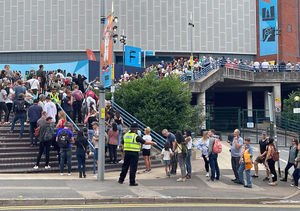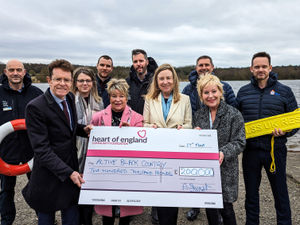Commonwealth Games: How 40,000 fans had to be diverted because of allotment cats
Police officers were left stranded and 40,000 people had to be diverted due to issues with cats at an allotment amid the Commonwealth Games, it has been revealed.
Debrief meetings relating to West Midlands Police's Operation Unity – the policing of the major competition during last year – revealed a string of issues faced by the force.
They highlighted a breakdown in logistics surrounding the Queen's Baton Relay, officers not having a meal for 11 hours and disruption from a legal challenge in Birmingham.
However, the overall operation has been hailed as a success, with the issues set to be taken into consideration ahead of the next Games being held in Victoria, Australia, in 2026.
The debrief meetings were held across a range of departments by the College of Policing, as part of the force's request to "support the learning process" and help planning in future.

It highlighted problems at the Walsall Road allotments in Birmingham, near to Alexandra Stadium where athletics competitions and the opening and closing ceremonies took place, surrounding "feral cats".
The report said: "The local authority (Birmingham City Council) was taken to court by a resident over an area of land that was to be sectioned off for an event at the stadium, prohibiting access to an old lady to care for a number of (feral cats) on a nearby allotment there.
"The lady won and the local authority had to change their plans. This in turn impacted upon the security zone that was in place for the stadium and that had to be changed, meaning that 40,000 people walking to the stadium had to be diverted."
Meanwhile, a draft Military Aid to Civil Authority (MACA) request was submitted in 2021, with the request signed off in January 2022 meaning there "wasn't enough time for the proper planning to utilise the military effectively".
The report showed the organising committee had consultants to advise them on specific areas of planning, while West Midlands Police had "allocated a resource to manage similar planning themes without any previous experience".
The briefing noted: "In some cases, police officers returning from sick leave were being given enormous tasks that should have been outsourced."
Another issue was the logistics surrounding the Queen's Baton Relay (QBR), although it was noted the route wasn't revealed to those involved until just four days before the actual event was announced to the public.
"Having no logistical support for the escort convoy led to numerous issues, such as officers being stranded in locations with no plan of how to get to the next stage of the QBR," the briefing said.
Meanwhile, recruitment for the events, while desiring to be inclusive, was recommended to be "practical and bespoke" in future, because of a conflict between HR advice provided and the practical needs of the process due to the physical and mental demands of the role.
It was noted a request went in during the planning phase that search teams would need feeding at the venues, but the logistics failed with transporting, getting people to the right place and feeding – meaning search officers were working at venues for 11 hours without having a meal.
The College of Policing added: "WMP sought to make opportunities to be involved in the Games inclusive and transparent and whilst this was applauded, it was felt that this led to some staff being put in a role that was beyond their ability.
"'Round pegs in round holes' was a phrase that was repeated during the debrief as being needed. Consequently, it was recommended that experienced staff should be used for major events, with development opportunities being given to individuals in deputy or support roles.
"There was also some frustration that police officers were used for specialist roles that should have been given to contractors or consultants from the start; the police service does not usually have transport, accommodation, and catering experts in-house and it was felt to be a false economy to try to develop staff in those areas whilst planning a major operation."
The report, however, praised the missing persons' team which enabled enquiries to be completed "expeditiously", well-established partnership working, an app designed to share information, and for collating crime data amid the list of recommendations.
West Midlands Police and Crime Commissioner Simon Foster said: "I want to place on record my thanks to West Midlands Police for running a highly successful security operation for the Commonwealth Games. It was not only a safe and secure Games, but also a friendly Games. That is a testament to the hard work, effectiveness and efficiency of everyone involved.
"I have previously flagged concerns around the private contractor security industry and its resilience. Those concerns remain. Pre-arranged military support meant that various failures were mitigated during the Games.
"I am concerned however, that chronic labour shortages in the private security sector are increasingly causing issues at major events. This is something that the sector and the Government need to give further careful consideration to. I am disappointed that its yet to happen.
"I also think it is clear that even more work should be done, to bring in external specialists to support the security work at major events. Overall though, it is clear that the security operation was a clear success and showed West Midlands Police at its best."





